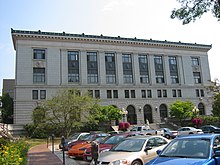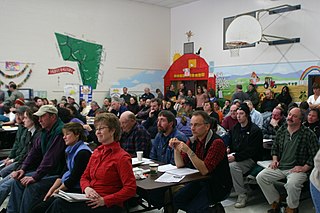
Town meeting, also known as an "open town meeting," is a form of local government in which eligible town residents can directly participate in an assembly which determines the governance of their town. Unlike representative town meeting where only elected representatives can participate in the governing assembly, any town voter may participate in an open town meeting. This form is distinct from town hall meetings held by elected officials to communicate with their constituents, which have no decision-making power.
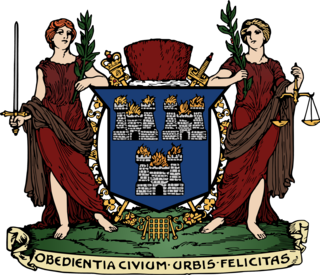
Dublin City Council is the local authority of the city of Dublin in Ireland. As a city council, it is governed by the Local Government Act 2001. Until 2001, the authority was known as Dublin Corporation. The council is responsible for public housing and community, roads and transportation, urban planning and development, amenity and culture and environment. The council has 63 elected members and is the largest local council in Ireland. Elections are held every five years and are by single transferable vote. The head of the council has the honorific title of Lord Mayor. The city administration is headed by a chief executive, Richard Shakespeare. The council meets at City Hall, Dublin.

The government of New York City, headquartered at New York City Hall in Lower Manhattan, is organized under the New York City Charter and provides for a mayor-council system. The mayor is elected to a four-year term and is responsible for the administration of city government. The New York City Council is a unicameral body consisting of 51 members, each elected from a geographic district, normally for four-year terms. Primary elections for local offices use ranked choice voting, while general elections use plurality voting. All elected officials are subject to a two consecutive-term limit. The court system consists of two citywide courts and three statewide courts.
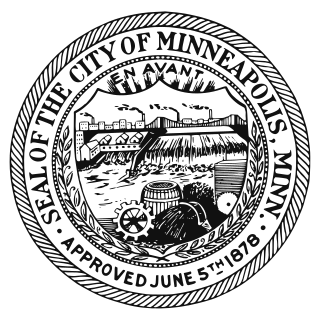
The Minneapolis City Council is the legislative branch of the city of Minneapolis in Minnesota, United States. Comprising 13 members, the council holds the authority to create and modify laws, policies, and ordinances that govern the city. Each member represents one of the 13 wards in Minneapolis, elected for a four-year term. The current council structure has been in place since the 1950s.
The Calgary City Council is the legislative governing body that represents the citizens of Calgary. The council consists of 15 members: the chief elected official, titled the mayor, and 14 councillors. Jyoti Gondek was elected mayor in October 2021 as the city's 37th. Each of the 14 councillors represent one of the city's 14 wards.

Riga City Council is the government of the city of Riga, the capital of Latvia. Its meeting place is in the Riga Town Hall at the Town Hall Square (Rātslaukums) in the very heart of Riga.
Massachusetts shares with the five other New England states a governmental structure known as the New England town. Only the southeastern third of the state has functioning county governments; in western, central, and northeastern Massachusetts, traditional county-level government was eliminated in the late 1990s. Generally speaking, there are four kinds of public school districts in Massachusetts: local schools, regional schools, vocational/technical schools, and charter schools.

The government of Detroit, Michigan is run by a mayor, the nine-member Detroit City Council, the eleven-member Board of Police Commissioners, and a clerk. All of these officers are elected on a nonpartisan ballot, with the exception of four of the police commissioners, who are appointed by the mayor. Detroit has a "strong mayoral" system, with the mayor approving departmental appointments. The council approves budgets, but the mayor is not obligated to adhere to any earmarking. The city clerk supervises elections and is formally charged with the maintenance of municipal records. City ordinances and substantially large contracts must be approved by the council.

The government of Louisville, Kentucky, headquartered at Louisville City Hall in Downtown Louisville, is organized under Chapter 67C of the Kentucky Revised Statutes as a First-Class city in the state of Kentucky. Created after the merger of the governments of Louisville, Kentucky and Jefferson County, Kentucky, the city/county government is organized under a mayor-council system. The Mayor is elected to four-year terms and is responsible for the administration of city government. The Louisville Metro Council is a unicameral body consisting of 26 members, each elected from a geographic district, normally for four-year terms. The Mayor is limited to a two consecutive term limit, while members of the Louisville Metro Council are not term limited.

Atlantic City, New Jersey, was incorporated on May 1, 1854. It is governed within the Faulkner Act under the mayor–council system of municipal government, implemented by direct petition effective as of July 1, 1982. The Atlantic City City Council is the governing body of Atlantic City. There are nine Council members, who are elected to serve for a term of four years, one from each of six wards and three serving at-large. The City Council exercises the legislative power of the municipality for the purpose of holding Council meetings to introduce ordinances and resolutions to regulate City government. In addition, Council members review budgets submitted by the Mayor; provide for an annual audit of the city's accounts and financial transactions; organize standing committees and hold public hearings to address important issues which impact Atlantic City. Former Mayor Bob Levy created the Atlantic City Ethics Board in 2007, but the Board was dissolved two years later by vote of the Atlantic City Council. Since its incorporation in 1854, the town has had 41 mayors.

The government of Portland, Oregon is based on a city commission government system. Elected officials include the mayor, commissioners, and a city auditor. The mayor and commissioners are responsible for legislative policy and oversee the various bureaus that oversee the day-to-day operation of the city. Portland began using a commission form of government in 1913 following a public vote on May 3 of that year. Each elected official serves a four-year term, without term limits. Each city council member is elected at-large.
Saint Paul, Minnesota is the capital of Minnesota. The city is also the largest city and county seat of Ramsey County. Saint Paul has a strong mayor-council government. Seven city council members elected in wards and one mayor elected at large serve the city.

The District of Columbia has a mayor–council government that operates under Article One of the United States Constitution and the District of Columbia Home Rule Act. The Home Rule Act devolves certain powers of the United States Congress to the local government, which consists of a mayor and a 13-member council. However, Congress retains the right to review and overturn laws created by the council and intervene in local affairs.

Roger Jonathon Reinert is an American politician, mayor of Duluth, Minnesota, and member of the Minnesota Democratic–Farmer–Labor Party (DFL). He served in the Minnesota House from 2009 to 2011 and the Minnesota Senate from 2011 to 2017.

The San Diego City Council is the legislative branch of government for the city of San Diego, California. The city council was first established in San Diego in 1850. The council uses a strong mayor system with a separately elected mayor who acts as the executive. There are currently nine members of the council. City council members serve a four-year term and are limited to two successive terms.

The mayor of the District of Columbia is the head of the executive branch of the government of the District of Columbia. The mayor has the duty to enforce district laws, and the power to either approve or veto bills passed by the D.C. Council. In addition, the mayor oversees all district services, public property, police and fire protection, most public agencies, and the district public school system. The mayor's office oversees an annual district budget of $8.8 billion. The mayor's executive office is located in the John A. Wilson Building in Downtown Washington, D.C. The mayor appoints several officers, including the deputy mayors for Education and Planning & Economic Development, the district administrator, the chancellor of the district's public schools, and the department heads of the district agencies.
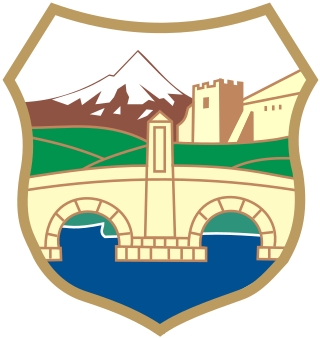
The mayor of Skopje is the city mayor who is representing North Macedonia's capital city Greater Skopje and all of its municipalities. Also, the mayor's decisions are confirmed or rejected by the City Council of Skopje. The obligations of the mayor include:

The Saint Paul City Council is the governing body of Saint Paul, Minnesota, United States, as part of a strong mayor–council government. It has seven members from seven wards, each elected to four-year terms. As of 2024, all seven are members of the Minnesota Democratic–Farmer–Labor Party, although city elected official positions are nonpartisan according to state law, and political party identifications are not included on election ballots.

Melvin Whitfield Carter III is an American politician who is the mayor of Saint Paul, Minnesota. Elected to his first term in 2017 and reelected in 2021, Carter is the 55th mayor of St. Paul and its first African American mayor. His current term of office ends on January 1, 2026. Carter has supported raising the city's minimum wage to $15 per hour. He is one of 11 U.S. mayors who co-founded Mayors Organized for Reparations and Equity, a coalition of municipal leaders dedicated to starting pilot reparations programs in their cities.

The mayor of Wrexham is the civic figurehead and first citizen of the city of Wrexham, and Wrexham County Borough in the north of Wales. The position is elected by members of Wrexham County Borough Council at their annual meeting, and today, holders of the position mainly serve a one-year term. The position is currently held by Councillor Beryl Blackmore of Marford and Hoseley for the 2024/2025 term.


